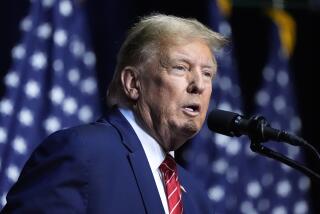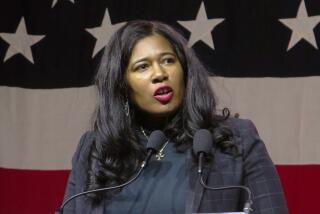Gingrich, Romney exchange blows
Newt Gingrich and Mitt Romney exchanged furious personal criticisms Monday, each accusing the other of gaining financially at the expense of Americans — criticisms usually leveled at the Republican presidential contenders by Democratic opponents.
Bristling at Romney’s suggestion during a Fox News interview Monday that Gingrich should return $1.6 million in payments that his firm received for advising mortgage giant Freddie Mac, Gingrich slammed Romney’s experience heading Bain Capital, a leveraged-buyout firm, for 15 years before becoming governor of Massachusetts.
“I would just say that if Gov. Romney would like to give back all the money he’s earned from bankrupting companies and laying off employees over his years at Bain, that I would be glad to then listen to him,” Gingrich told reporters after a Londonderry town hall.
“I’ll bet you $10, not $10,000” — he continued, referring to Romney’s much-criticized $10,000 bet in Saturday night’s debate — “that he won’t take the offer.”
During an afternoon event at a New Hampshire lumber company, Romney argued, as he often does, that Bain’s efforts to make companies more profitable resulted in the creation of thousands of jobs and said that the experience would help guide him in his effort to improve the economy.
“In the real economy, some businesses succeed and some fail. That’s how it works,” Romney told reporters at the lumber company, according to a recording provided by his campaign. Turning back to Gingrich’s work for Freddie Mac, the mortgage giant that many Republicans blame for the collapse of the housing market, Romney added: “If he was there because of his political connections and then if Freddie Mac fails, I think a fair question is asked — why did he profit if Freddie Mac failed?”
The exchange between the two men — reminding voters of each candidate’s serious vulnerabilities — illustrated the dangers for the Republican party of a drawn-out race for their party’s nomination. It came as Gingrich, looking to cement his status as front-runner, embarked on a series of events in New Hampshire, where Romney has long held an expansive lead.
One of Gingrich’s events was a genteel afternoon debate with fellow candidate Jon Huntsman Jr., in which the former House speaker restated his advocacy of a more muscular U.S. foreign policy that would include “regime change” in Iran.
In the style of the 1858 Lincoln-Douglas debates, the two candidates spoke at length about their views on world hot spots including Afghanistan, Pakistan, Syria, Libya and China — granted a rare opportunity to deliver five-minute answers on each as well as follow-up remarks.
The regime change proposal echoed Gingrich’s comments in a November foreign policy debate.
“Their senior leadership has seen themselves as being at war with us for over 30 years. We keep finding excuses,” Gingrich said. “They’ve had a consistent pattern of being our enemies and we’ve had a consistent pattern of denying it, apologizing, walking away from it. I believe we cannot allow them to have a nuclear weapon; therefore I believe we have to be for regime change, and I’d adopt a strategy that was very clear that, unless they agree to unilaterally disarm their entire system, we are going to replace their regime.”
“Ideally you would do it non-militarily,” Gingrich said. “But we are not going to tolerate an Iranian nuclear weapon.”
Huntsman, a former ambassador to Singapore and China, took a more measured view, stating that “all options should be on the table” when it comes to dealing with Iran.
Both Huntsman and Gingrich called for major adjustments in the U.S. relationship with Pakistan.
“For all the aid money that we put into Pakistan, are we seen in a better light as a country? The answer is no,” Huntsman said. “There are over 100 nukes in that country and we want to make sure that doesn’t give rise to a proliferation problem… They need to cooperate with us in the area of counter-terrorism. We need access for purposes of intelligence collection.”
“It’s a transactional relationship at best,” Huntsman said. “Any aid money that goes in there — if we can afford any at all, and we have to look very carefully at that — should be tied very specifically to outcomes.”
As with Iran, Gingrich and Huntsman differed on U.S. involvement in Libya. While Gingrich favored U.S. intervention, Huntsman said the U.S. did not have a strategic interest in Libya and should have considered greater involvement in Syria, which he said was used as a pipeline by Iran for its activities in the region. “That is one we need to pay some attention to,” he said.
The warmth between the two men was evident. Gingrich reminisced about visiting Huntsman to talk about health policy while he was governor of Utah, and later visiting him in China just two days after Huntsman had taken his post as President Obama’s ambassador to that country.
Huntsman at one point called Gingrich a “great historian.” After the event, the former ambassador — who is in single digits in the polls — said he thought Gingrich would make a great vice president.
More to Read
Start your day right
Sign up for Essential California for news, features and recommendations from the L.A. Times and beyond in your inbox six days a week.
You may occasionally receive promotional content from the Los Angeles Times.







